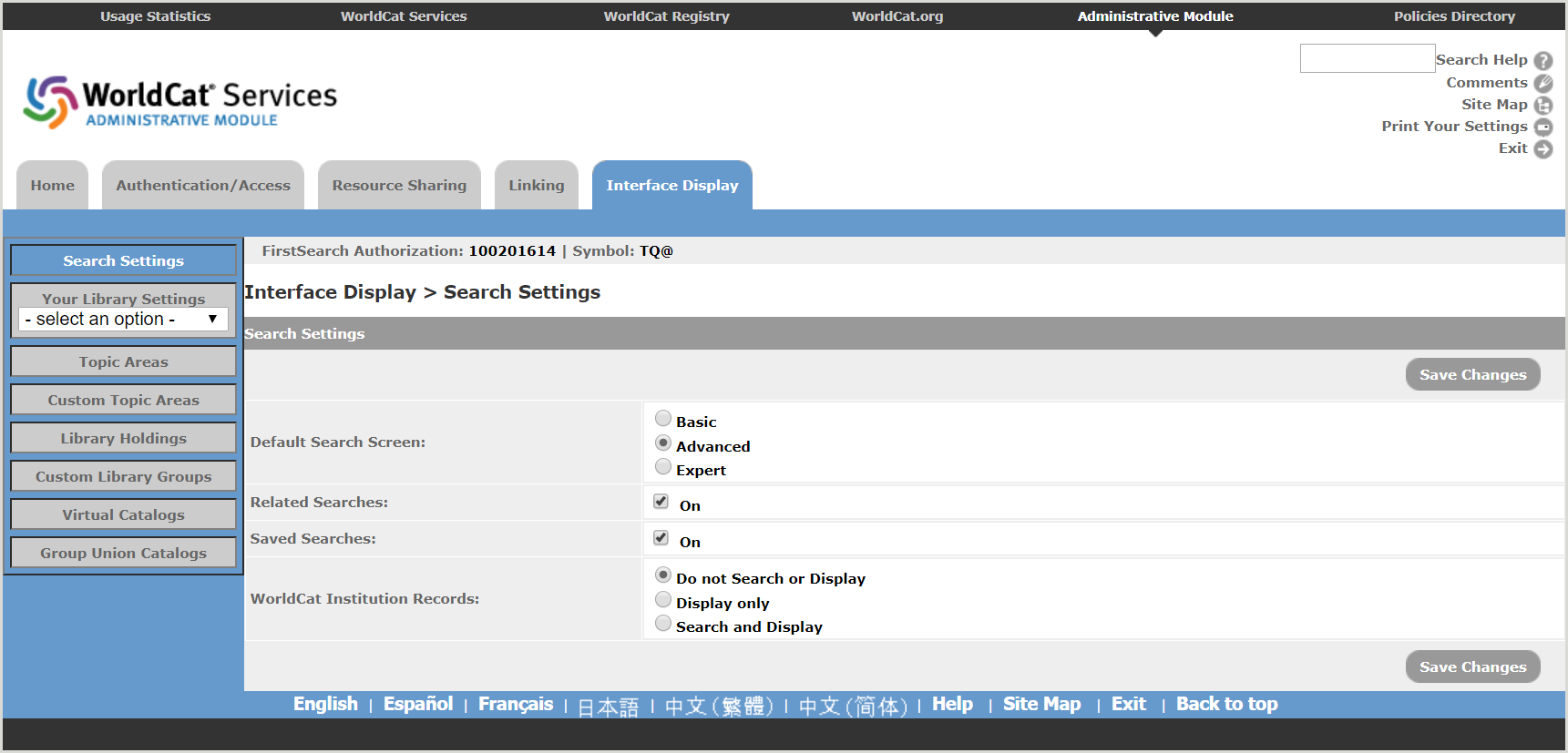WorldCat Services Admin module
The purpose of the WorldCat Services Administrative module is to help you:
- Customize FirstSearch to meet the needs of your users and staff
- Integrate FirstSearch with your library services (such as interlibrary loan)
- Control database searching costs for your library
Basic settings you should be aware of
Logging on to the Administrative module
Access the WorldCat Services Administrative module and log in using your assigned authorization and password. For your initial login, you can use the same authorization and password you use for the FirstSearch user interface.
Passwords
OCLC suggests the following guidelines for new passwords:
- Use at least four, but not more than 10, characters in the password. (You cannot type more than 10 characters when setting a new password in the administrative module.)
- Use only letters (a-z) and/or numbers (0-9) in the password.
- Do not use spaces, punctuation, or symbols in the password.
- For added security, specify different characters for each password. For example, do not specify the same password for the administrative module that you specify for the FirstSearch service.
To change your password in the administrative module, click the Authentication/Access tab, then click Passwords in the sidebar menu.
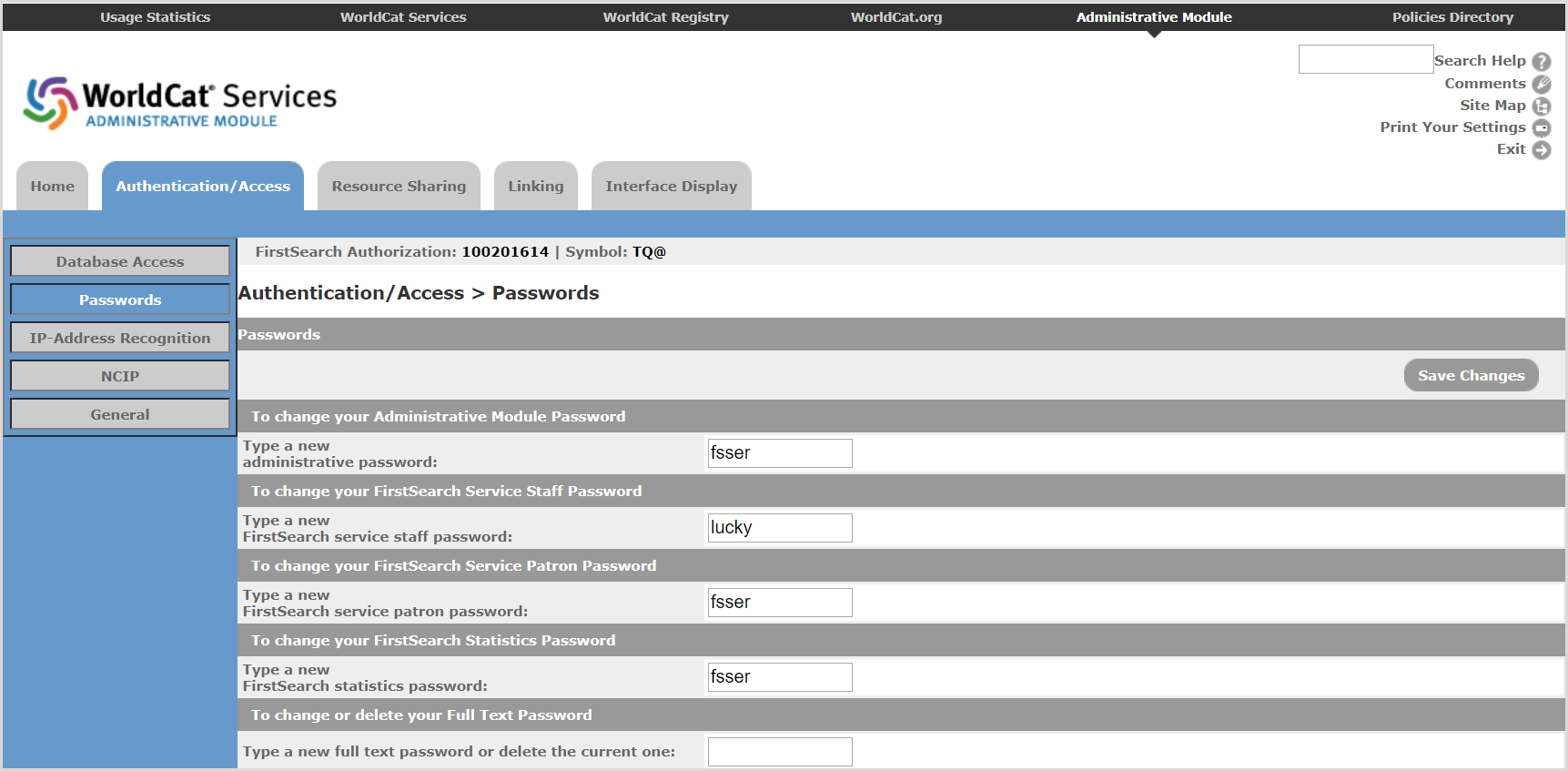
Timeouts
If a user does not send a request to FirstSearch for several minutes, FirstSearch automatically ends the session. In the administrative module, you may specify the number of minutes that FirstSearch waits for a request before ending a session.
To set timeouts, click General in the sidebar menu of the Authentication/Access section.
Session Timeout
Specify the number of minutes (between 5 and 30) that FirstSearch waits for a request before ending the session if the user is viewing any FirstSearch screen (for Full Text Timeouts, see below).
Full Text Timeout
Specify the number of minutes (between 15 and 45) that FirstSearch waits for a request before ending the session if the user is viewing, downloading, or printing the full text of a journal article or other document.
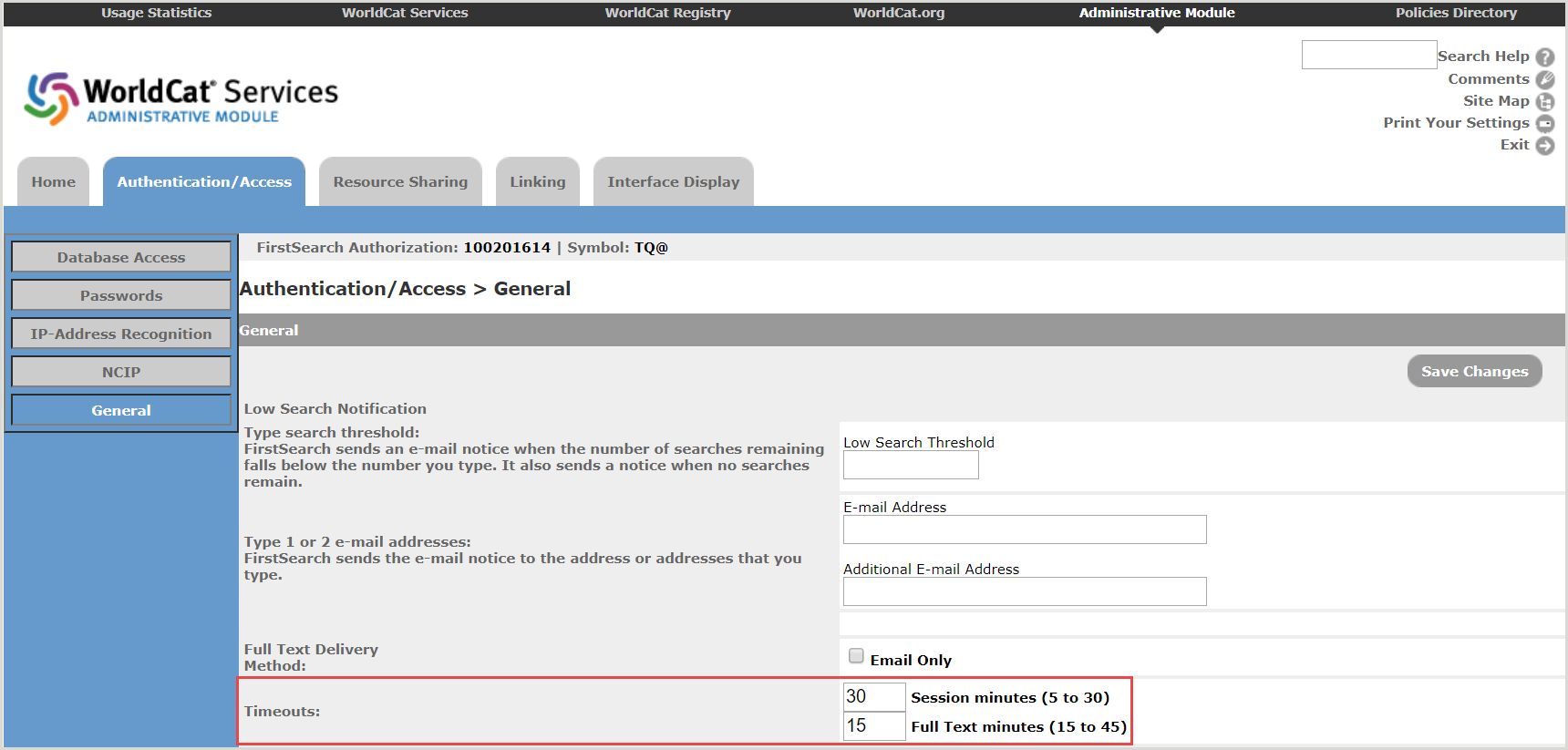
Using IP address recognition
For IP address recognition, you specify which IP addresses may use your FirstSearch authorization to access the system. If you wish, you can add links that lead to FirstSearch from your library's web pages. The links contain special IP address recognition URLs and work only for users with the specified IP address.
Click IP-Address Recognition in the sidebar menu of the Authentication/Access section to define IP addresses that can access FirstSearch.
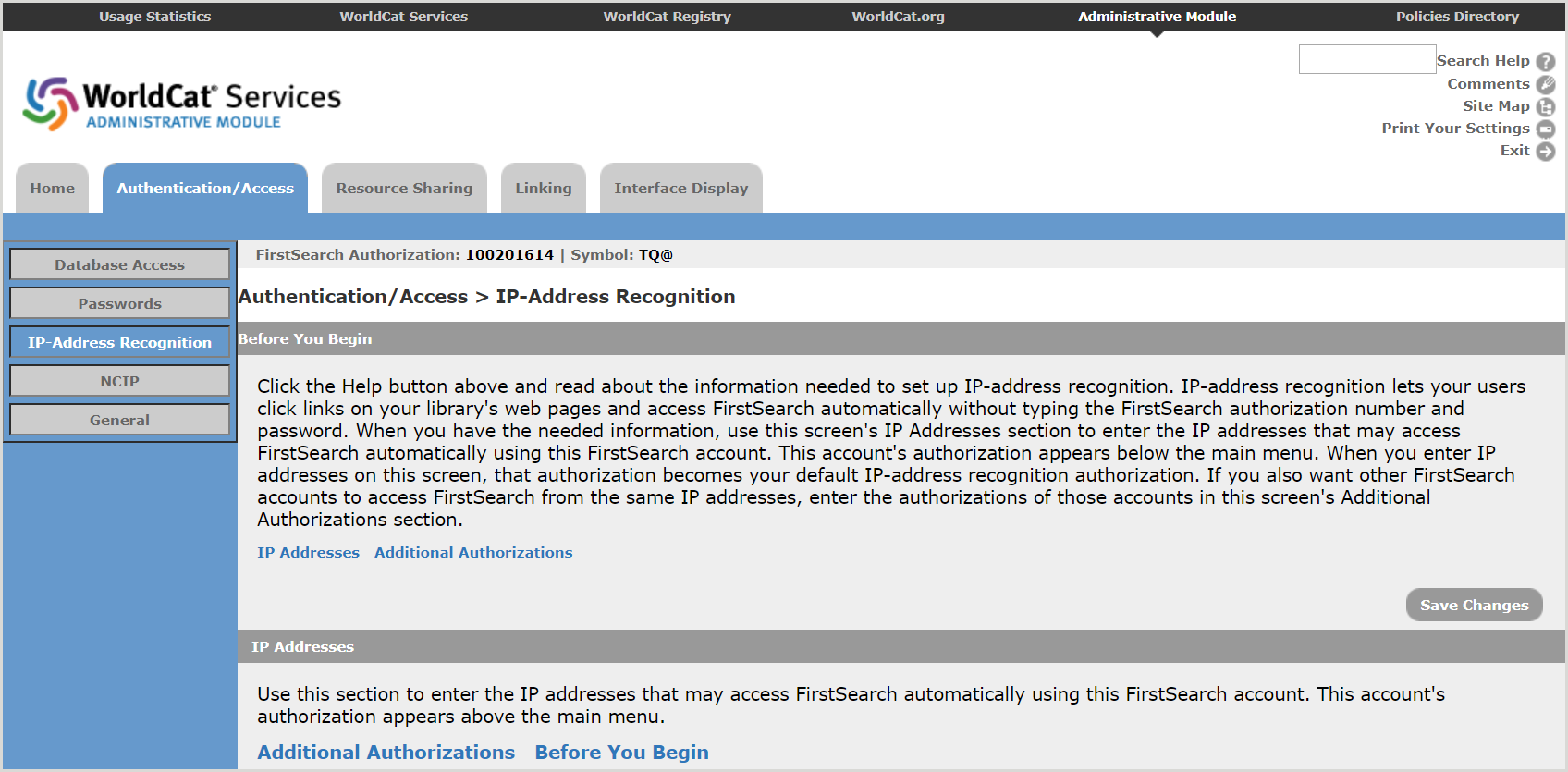
OpenURL links
The OpenURL links feature lets you add links in FirstSearch that lead to your library's servers. If you add the links, they appear in detailed records when you search FirstSearch databases. This enables users to more easily find information in your library. You may also use OpenURL links to create links to Ask a Librarian.
To define OpenURL links, click OpenURL links in the sidebar menu of the WorldShare Interlibrary section of the administrative module.
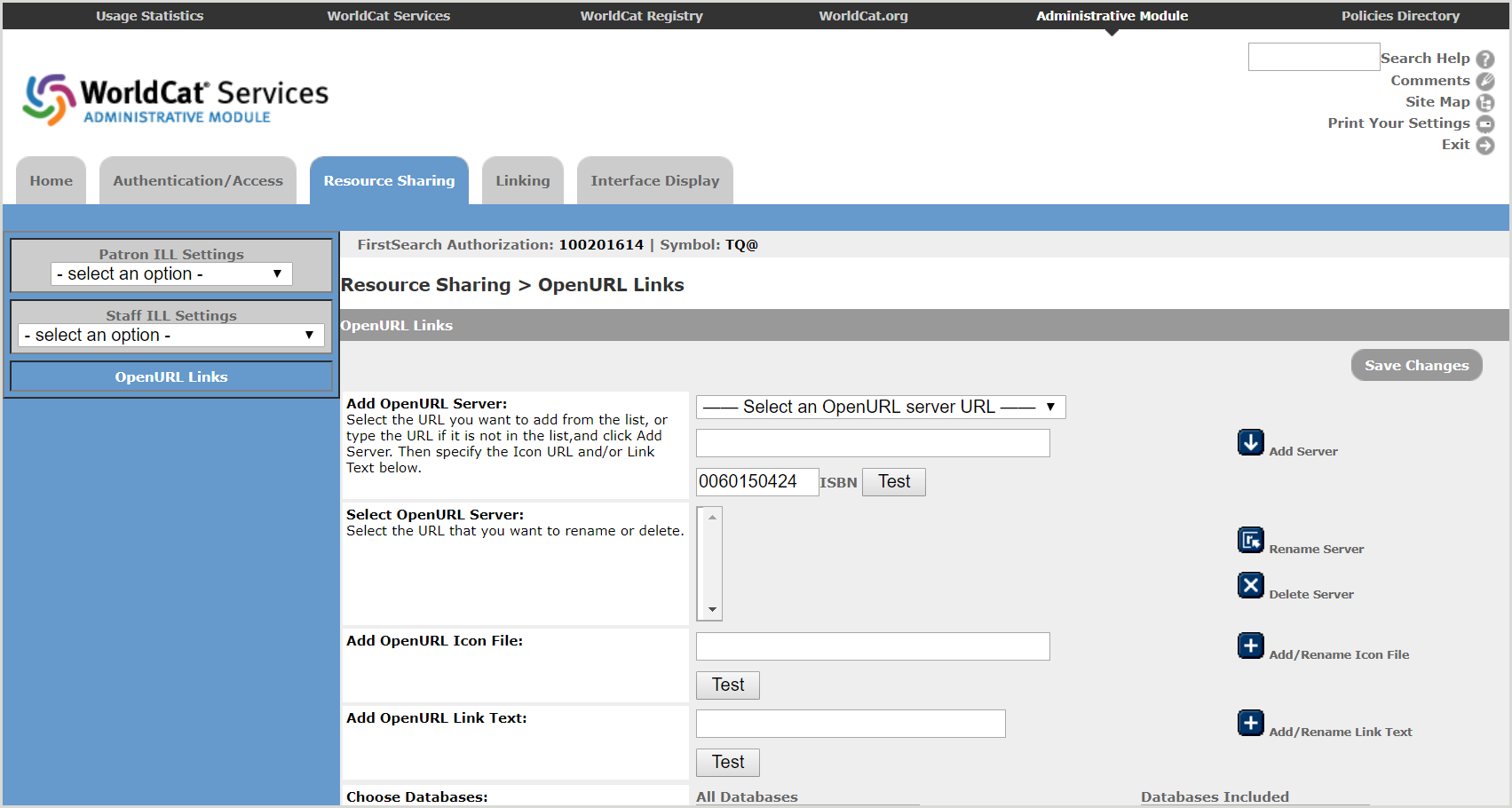
Your Library
Click Your Library Settings in the sidebar menu of the Interface Display section of the administrative module to customize the interface for your users. See below for Your Library Settings options.
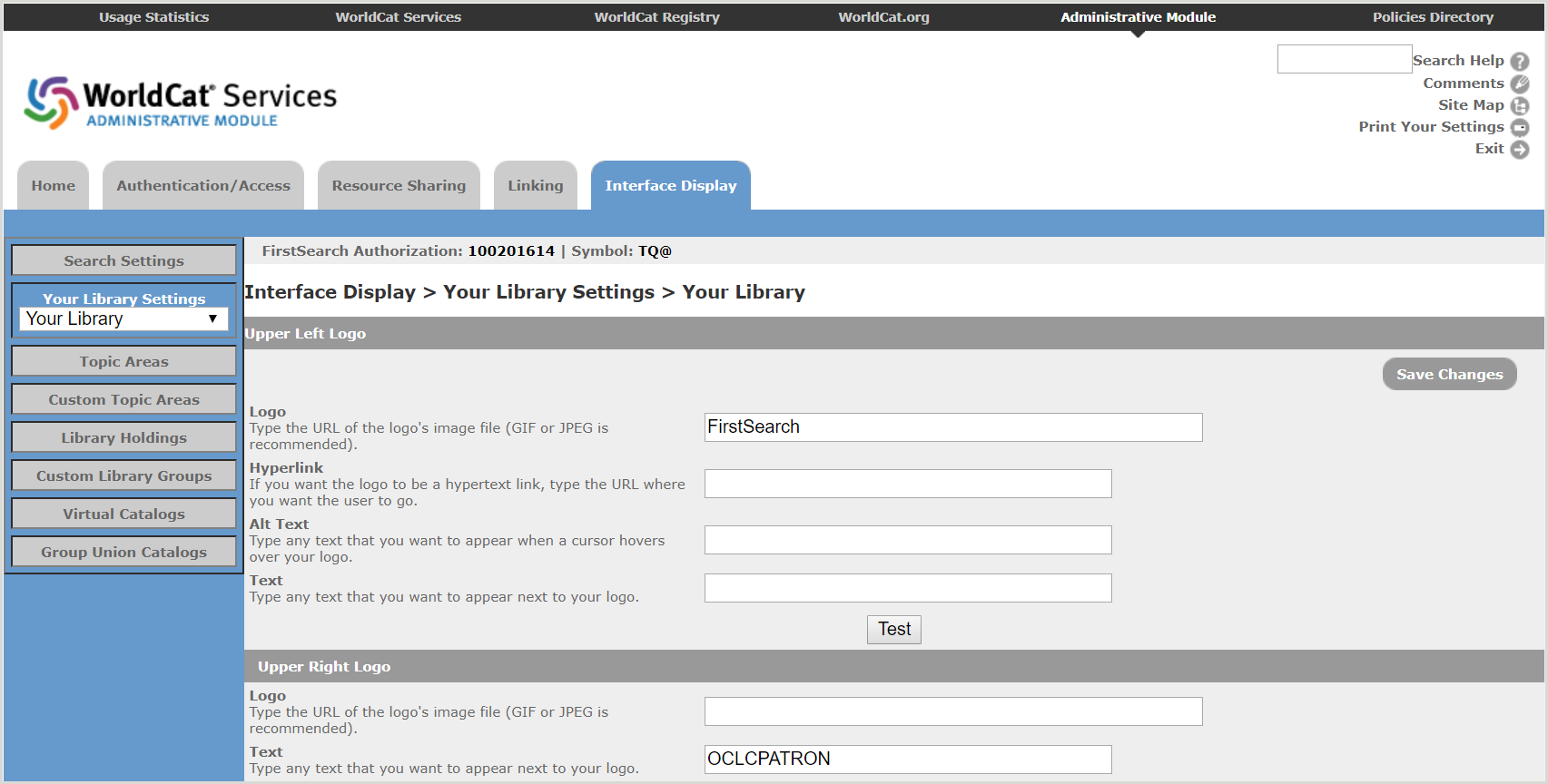
Your library's logo
You can add your library's logo or image to the FirstSearch service by entering the URL of the logo's image file. If you do, your logo appears throughout each FirstSearch session at either the upper left or upper right of each FirstSearch screen, depending on where you designate it to appear.
Your library's custom web links
You can provide links that lead from FirstSearch to web pages that you choose. For example, the links might lead to your library's home page, to your Ask a Librarian page, or to a preferred search engine page.
Note: Any links that you specify appear throughout each FirstSearch session near the top of all FirstSearch screens. If you also add your library's logo to FirstSearch, the links appear directly below the logo.
Features you may want to use when you are more familiar with the WorldCat Services Administrative module
Resource Sharing Settings
You can let users submit interlibrary loan (ILL) requests to your library while they are using FirstSearch databases. You can set your Resource Sharing settings in the Resource Sharing section of the main menu of the administrative module.
To access the Resource Sharing section of the administrative module:
- Click the Patron Resource Sharing tab in the FirstSearch UI.
- Enter your admin User Name and Password.
- Click I agree to the terms and conditions. The Administrative module opens to the Resource Sharing tab.
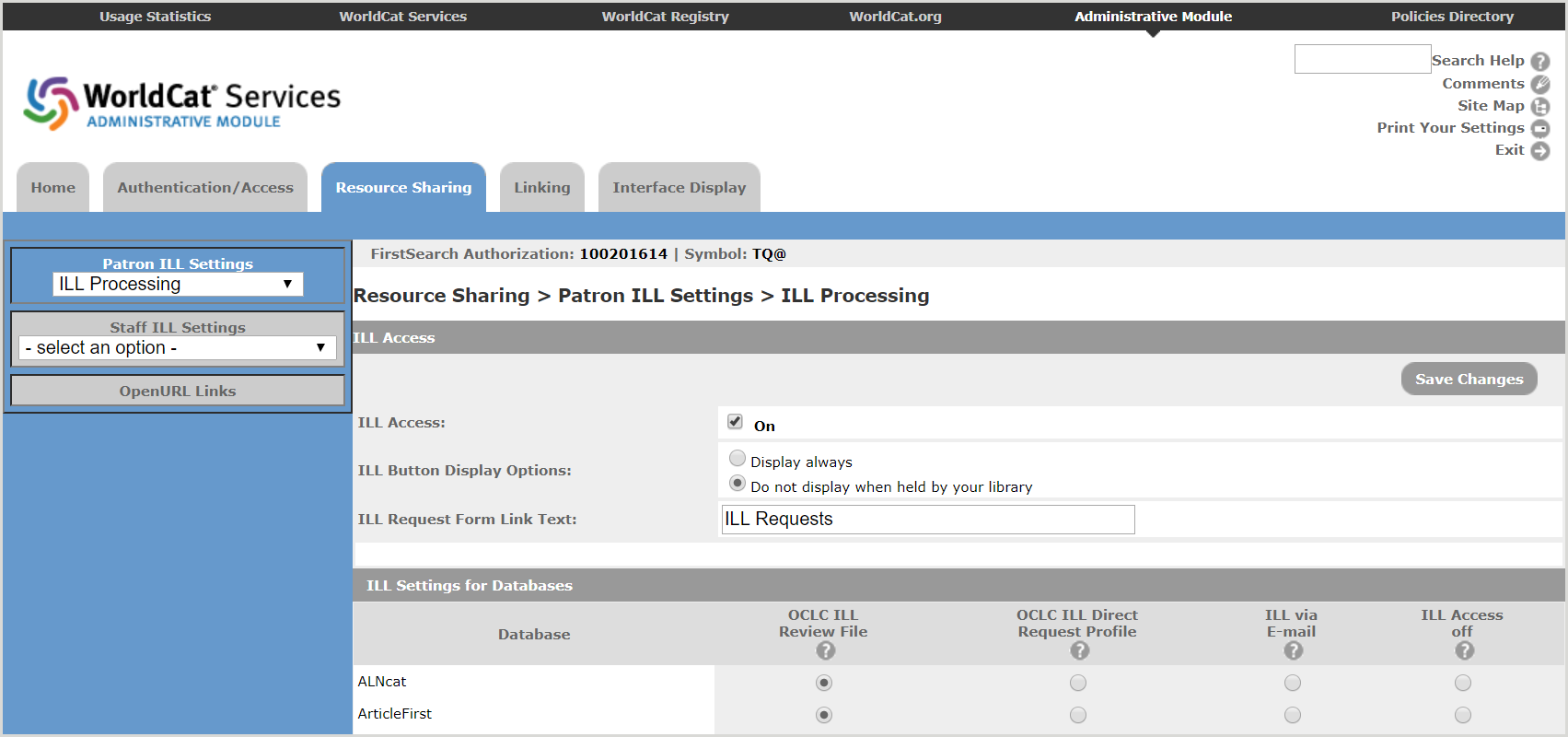
ILL Processing
Use the ILL Processing feature (under Patron ILL Settings) to:
- Turn on ILL access and let users submit ILL requests while using FirstSearch. (This feature will also let you designate when the ILL button will appear to users.)
- Customize the text in the Patron ILL Request Form link.
- Control ILL processing by selecting the FirstSearch databases from which users can submit ILL requests and the method used to process the requests for each database.
WorldCat ILL Access
Use the WorldCat ILL Access feature (under Patron ILL Settings) to control the document types that your institution's FirstSearch users can request through ILL.
Patron ILL Request Form
Use the Patron ILL Request Form feature (under Patron ILL Settings) to customize the FirstSearch ILL request form for your users.
ILL via E-mail
Even if your library does not use the OCLC ILL service, you can let your users submit ILL requests by selecting the ILL via E-mail option for one or more databases. Use the ILL via E-mail option (under Patron ILL Settings) to control the email message that your library receives when a user submits an ILL request. Use the option to specify the one or two email addresses that will receive the messages. Also, use this option to specify borrowing library information so the email message includes that information as well.
ILL Request Management
Use the ILL Request Management feature (under Patron ILL Settings) to set ILL display options for your users. You can determine whether Cancel and Renew options are available for ILL users and decide whether to display the due date for ILL loans.
Authorizations
Use the Authorizations option (under Staff ILL Settings) to designate the FirstSearch authorization for one or more staff members at your institution who will handle ILL processing.
Note: An OCLC ILL authorization can link to only one FirstSearch authorization.
Dati costanti
Constant data is stored information that you can use to save keystrokes, reduce errors, and ensure consistency when you initiate or respond to ILL requests. Using constant data accomplishes the following:
- Automatically transfers repetitive data to ILL workforms and requests
- Adds to or modifies repetitive data when processing groups of requests or responses
Constant data can be created to fit routine borrowing or lending situations. The Constant Data Options are found under Staff ILL Settings, as are the following three features.
Saved notes
Conditional (Saved) Notes are used to set any conditions for borrowing or lending. Special library hours, library lending practices, or general information may be noted.
Custom holdings
Custom holdings allow you to organize and customize library holdings displays to improve access to the OCLC symbols of your preferred lenders.
DIRECT REQUEST PROFILES
Automated Request Manager (formerly Direct Request Profiles) automates your ILL request process; it automatically sends patron-generated ILL requests created in your system to WorldShare ILL.
Per-Article Purchase Settings
The Purchase Settings feature lets you control the cost of purchasing articles found in FirstSearch search results. The Journal Settings feature lets you turn access to full text on and off by journal.
Using NCIP authentication
Library patrons sometimes request access to library services from remote locations. Libraries need to be able to authenticate and authorize access for these remotely located patrons. Patron authentication for the FirstSearch service through the use of the NISO Circulation Interchange Protocol (NCIP) allows library patrons to gain appropriate access to FirstSearch from any location.
The FirstSearch service currently allows access via manual logon, IP address recognition, scripted access, IP referer, and Athens authentication, none of which provides a complete access solution for all remote users. The NCIP-based patron authentication feature does not replace these existing authentication methods, but complements and supplements them.
To define NCIP authentication for your library or institution, click NCIP in the sidebar menu of the Authentication/Access section of the administrative module main menu.
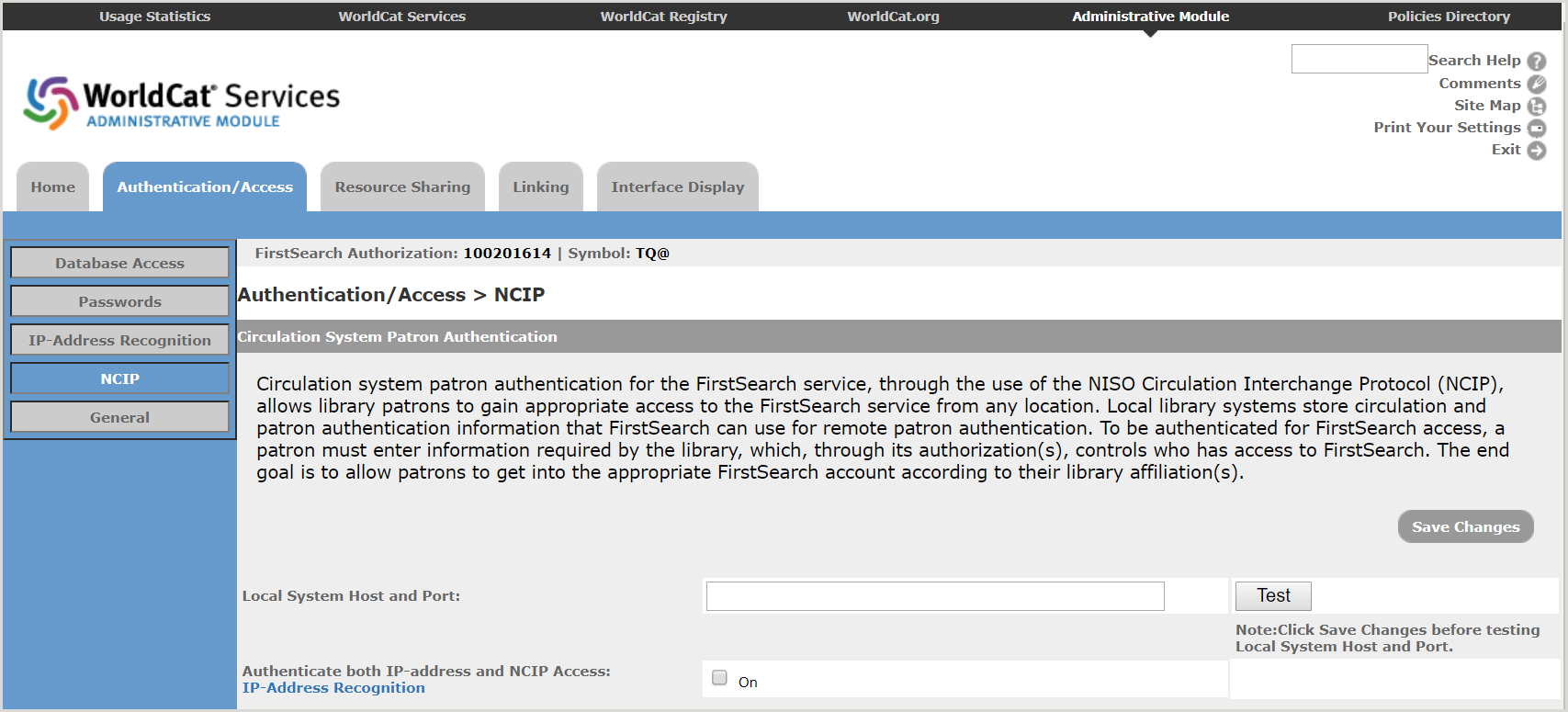
Linking to online booksellers
Participating booksellers work with libraries to link their services and users with libraries' services and users through WorldCat and the World Wide Web. When a user clicks the link to a bookseller in a FirstSearch record, FirstSearch submits a request to the bookseller's service for the item described in the record. The bookseller's website displays its results screen with a FirstSearch heading and Return button so the user can easily return to FirstSearch after visiting the bookseller's service.
This feature is found under the Linking tab and by clicking Online Booksellers in the sidebar menu. For information about a bookseller's services and programs, click its name in the Bookseller column of the Online Booksellers screen to go to a website about the bookseller.
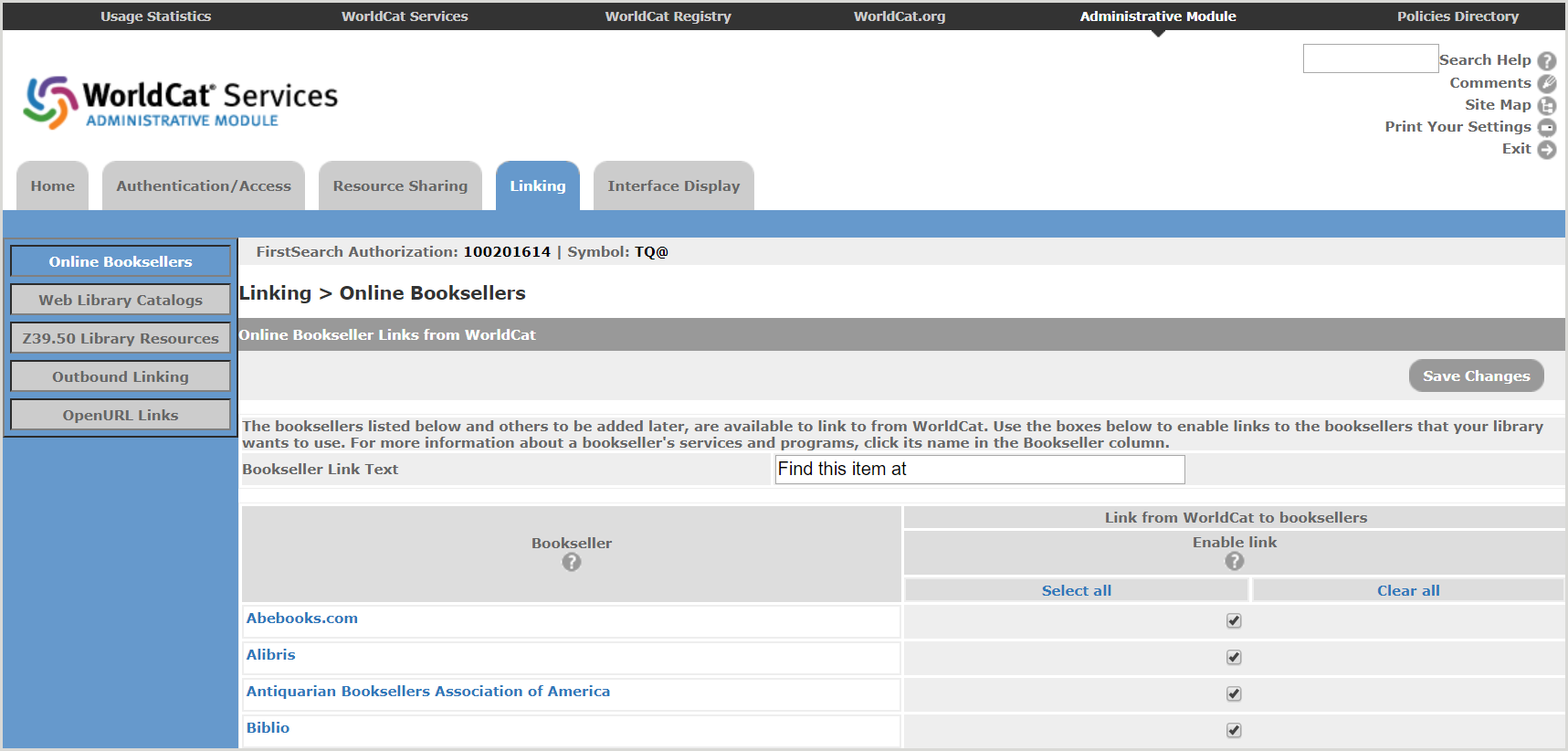
Using web library catalogs
You can add links to your library's catalog from the FirstSearch service by entering URLs for your catalog, using the Web Library Catalogs option (under the Linking tab). If you do, these links appear in FirstSearch records in select databases so users can click the links to use your catalog and determine an item's availability and location.
When a user clicks a link and goes to your catalog, FirstSearch adds a heading and a Return button above the screen so the user can return to FirstSearch easily. To use this feature, you must supply at least one of the four URLs requested.
Click Web Library Catalogs in the sidebar menu of the Linking section of the main menu to go to the Web Library Catalogs screen.
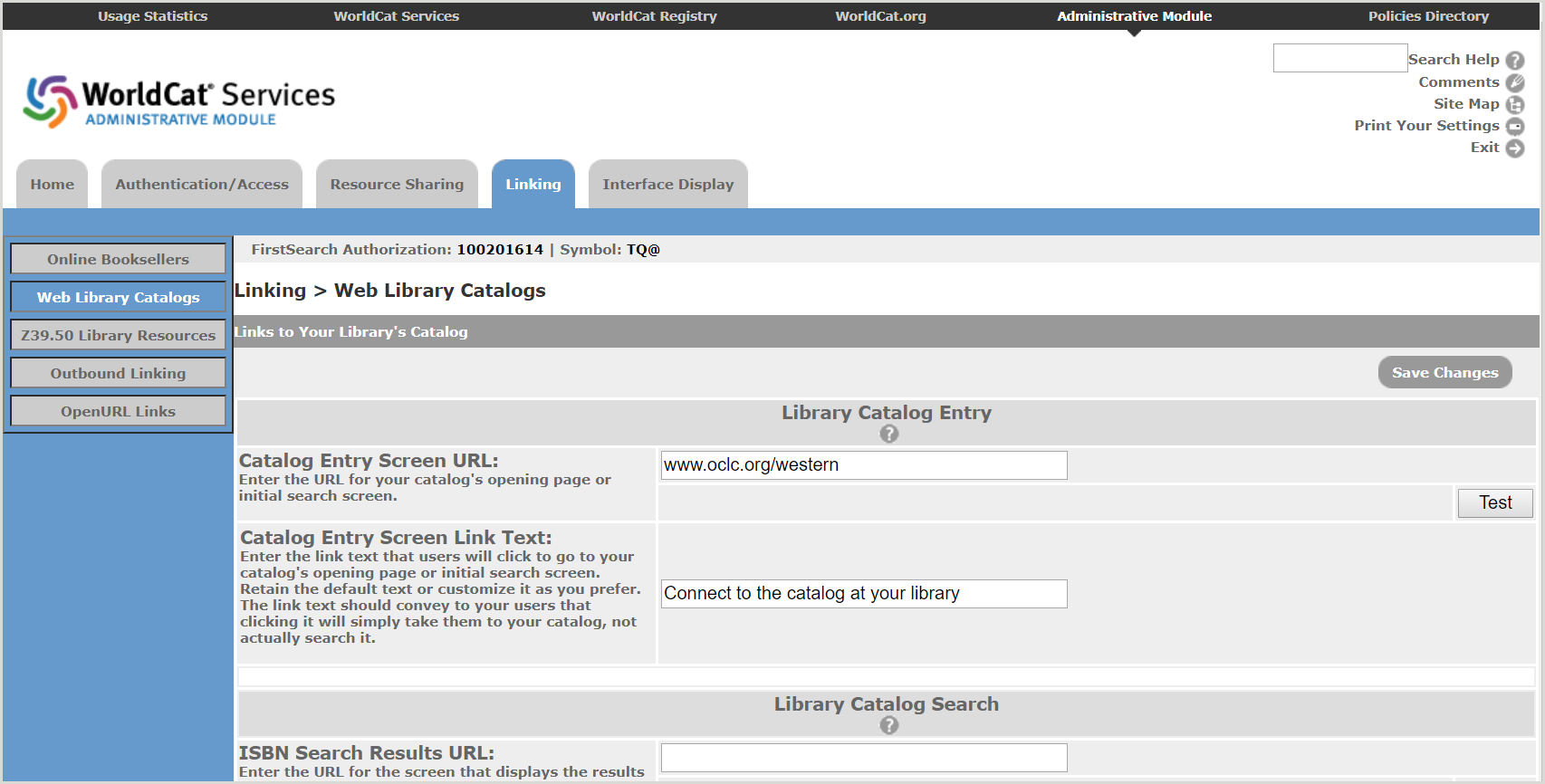
Outbound linking
FirstSearch outbound linking lets you increase the amount of full text available to your users. It lets you provide links from FirstSearch detailed records to the full text of those items in other services that your library uses, such as NetLibrary, Infotrieve, CISTI, and JSTOR.
When OCLC establishes a new outbound linking to a particular service, it adds an additional option to the Outbound Linking screen in the administrative module to let you turn on the links to that service. If you make use of outbound linking, your users will see links to the various services when they view detailed records in FirstSearch. When a user clicks one of the links, FirstSearch provides access to the other service. It adds a heading and a Return button above the other service's screens so the user can return to FirstSearch easily.
Click Outbound Linking in the sidebar menu of the Linking section of the main menu to go to the Outbound Linking screen.
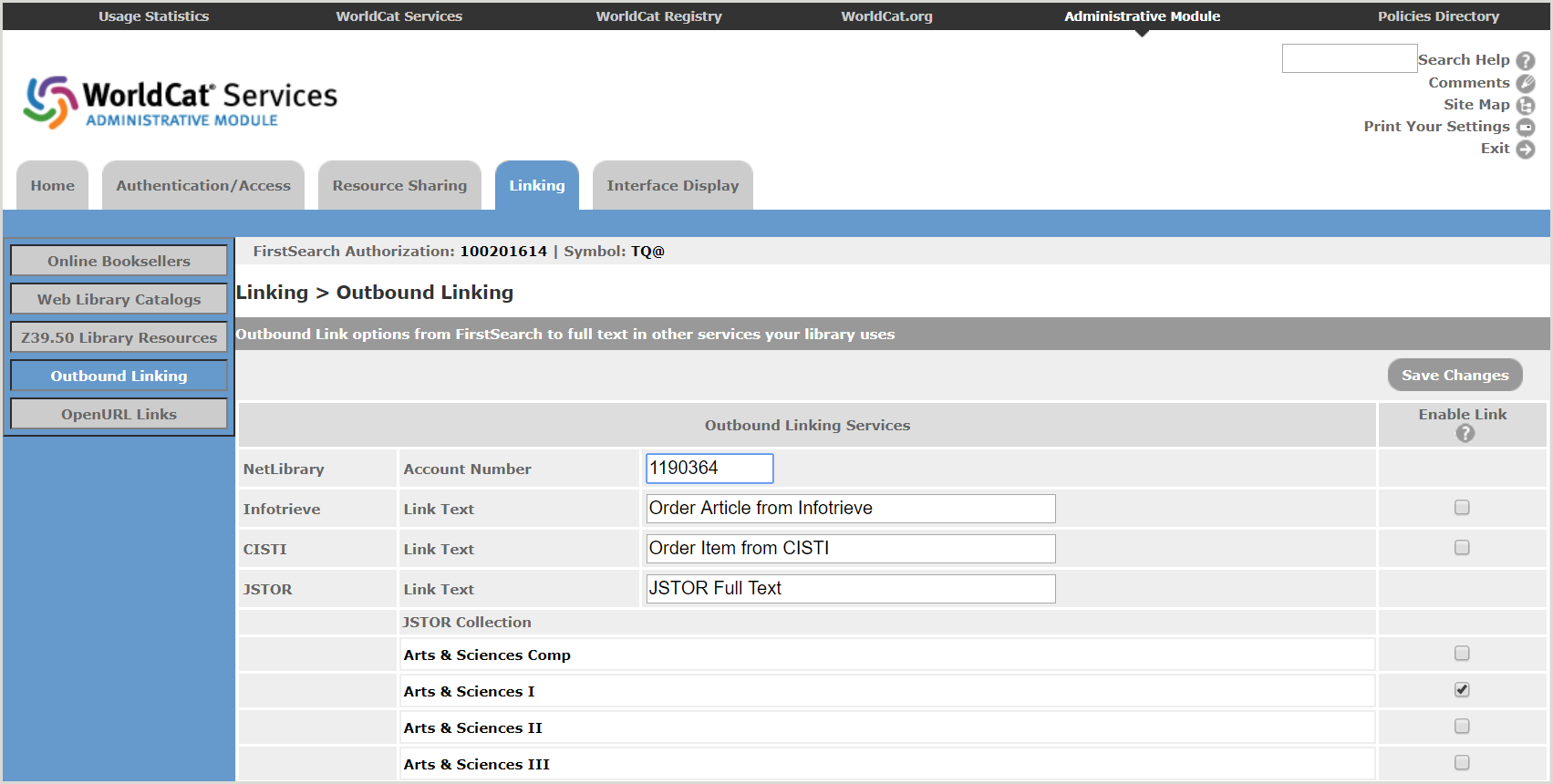
Search settings
Click Search Settings in the sidebar menu of the admin module's Interface Display section. Use Default Search Screen to select the search screen that FirstSearch displays when a user begins a new search without choosing a specific search screen. Users can choose another search screen if they do not want to use the default that you select.
Select the default search screen that best meets the needs of your users:
- Basic
- Avanzate
- Expert
Check the Related Searches box if you want to provide the Find related feature to your users. This feature helps users find additional records that match their latest search and provides links to selected databases. If a user clicks the link to a database, FirstSearch performs the latest search in that database and displays the search results.
Check the Saved Searches box if you want to provide the Save Search feature to your users, allowing users to save their searches.
